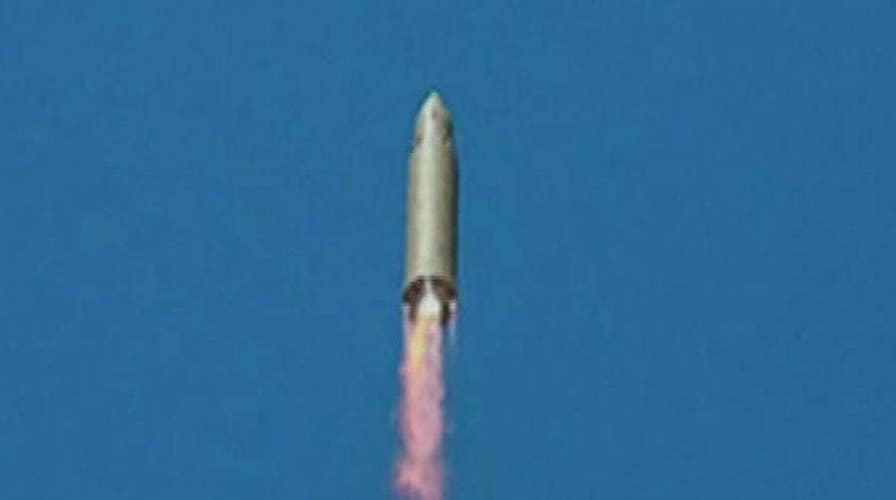North Korea claims first ICBM missile test ahead of G20
Kevin Corke reports from the White House
In 49 B.C., Julius Caesar’s army crossed the Rubicon and changed history. So did America’s founding fathers, exactly 241 years ago. North Korea’s launch of what it claims was an intercontinental ballistic missile – on July 4, of all days – could be another historic point of no return. Or it could be just another taunting gesture by that country’s head-case president, Kim Jong Un.
Either way, President Trump should react with extreme caution. It’s one thing to tweet; it’s another to attack.
While the most-discussed nightmare scenario is a nuclear-tipped ICBM, an equally horrifying possibility is that North Korea has developed, and uses, a so-called super electromagnetic pulse weapon -- EMP – that could potentially take out America’s electric grid. “We know that North Korea got the design plans for an EMP from Russia years ago,” says Frank Gaffney, a former assistant secretary of defense under Ronald Reagan. “If they have one, they could take us, overnight, from the world’s only superpower to a pre-industrial society. Everything we need to live today depends on electricity.”
President Trump should react with extreme caution. It’s one thing to tweet; it’s another to attack.
The timing of the North’s announcement —that it had successfully test-fired a missile that South Korea confirmed travelled more than 500 miles before settling into the sea – was almost certainly intended to rattle the United States as it celebrates its own birthday. It also comes days before President Trump attends the G-20 summit in Hamburg. There, he will have to confront nervous U.S. allies like Germany and France, as well as potential adversaries like Russia and China.
Both groups will want reassurance that the leader of the free world – that’s you, by the way, Mr. Trump – will not act impulsively, will consider the potential ramifications of his response, and will listen to advice from his military and national security team before ordering any action that can’t be undone.
The greatest sense of alarm will doubtless come from South Korea and Japan, which lie within easy range of the North’s missile capability. They will want to know that the United States remains committed to their defense and will act against Kim if necessary.
By contrast, China, which provides economic support and diplomatic cover for the unhinged master of Pyongyang, will want Trump to reconsider his warning, delivered by phone directly to President Xi Jinping Sunday night, that the U.S. is ready to take unilateral action against the hermit kingdom.
Even China may not be able to stem Kim’s craziness. “North Korea has shut the door on China’s efforts to modify his behavior so far,” says Sourabh Gupta, a senior analyst at the Institute for China-America Studies. He predicts that while China will allow the United Nations to impose yet more sanctions on North Korea, it will continue to push for a diplomatic solution.
And Russia, which is already at odds with the U.S. over its annexation of the Crimea in Ukraine, and its steadfast support for Syrian dictator Bashir Al-Assad, is unlikely to stand by quietly if the U.S. decides to administer a military punishment to one of Moscow’s erstwhile allies.
All these angles play against Trump’s impetuous nature. But at this moment – the 241st anniversary of our nation’s declaration of independence – cool reflection of all our options is in order.
Our nation was founded by revolutionaries, yes. They knew what they believed in and what they wanted to achieve. Thank God, none of them was on Twitter.





















